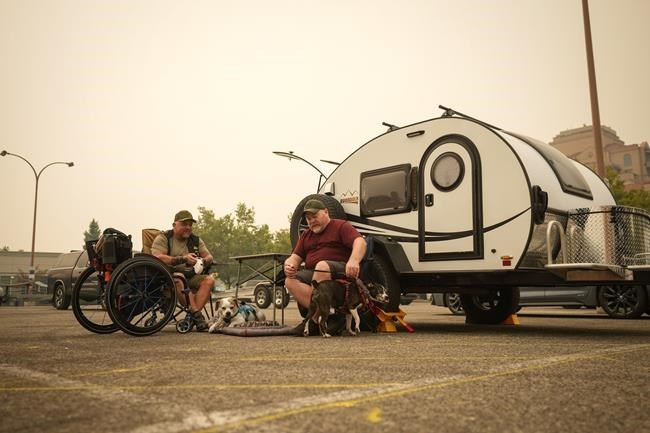KELOWNA, B.C. — Robert Pullen and his husband, Warren, got a knock on their door on Thursday night from a neighbour, and estimate they had about 10 minutes to get out the door.Â
A fast-moving wildfire was approaching their home on Knox Mountain in Kelowna, B.C.Â
Robert credits his background in the military for having them ready to leave so quickly, along with the couple’s two dogs.Â
Barking orders at his partner of 20 years as if he was still in uniform may have been a bit much — causing an eye roll and a friendly laugh in hindsight — but the stress eventually turned to relief. Life goes on.Â
The couple is among more than 30,000 evacuees fleeing wildfires across British Columbia.Â
Some face uncertain futures, with the prospect of their homes and communities being destroyed, or their livelihoods lost.
Outside Kelowna’s Prospera Place arena, which is hosting evacuees, the Pullens chat in camp chairs in the parking lot, having decided to leave a local mall where other evacuees had gathered and partied.Â
“It was just too bright, too loud, there's no bathrooms,” Robert said.Â
“There was a lot of people gathered around sitting and having good time,” Warren said. “Having a good time in this circumstance is difficult to think about.”Â
The pair and their pets now have to wait it out, sharing a small trailer they towed behind their vehicle, hoping they still have a home to go back to.Â
Okanagan fire chiefs told a briefing Sunday that it's not yet known when residents evacuated from homes in West Kelowna and Kelowna might be allowed back, as neighbourhoods are checked and secured, and the fire fight continues.
“What’s going to happen? Who knows? It happened so quick and, you know what? Tomorrow we might not have a home,” Warren said.Â
So far, though, the couple has been monitoring the situation with their doorbell camera and their home security system. Their home was OK as of Saturday afternoon, as far as they could tell.
Others forced from their homes didn’t have the benefit of military-trained vigilance, describing harried moments as they attempted to pack up quickly.
Megan Michaluk was at her home near McKinley Beach, watching the McDougall Creek fire across the lake from her patio and thought she was safe.
Every few minutes the fire seemed to grow with the whipping winds.Â
“It was terrifying to see how quickly it was just completely consuming the west side,” she said.Â
She started getting text messages from friends, insisting she leave just to be safe. At about midnight she started packing.Â
“I didn't pack sensibly at all,” she said. “I was just, like, throwing stuff in.”Â
In her bag was a winter coat, a dress she had for a wedding she planned to attend, admitting that in the confusion of the moment, “what I packed was just ridiculous.”
She tried to get back into her neighbourhood the next morning but was turned away. She’s comfortable at a friend’s place for the time being, she said.Â
Michaluk wasn’t the only one dealing with frayed thoughts as she packed her bags.Â
Denise Kenney, a professor at the University of British Columbia Okanagan, said she and her family were caught off guard before having to flee their home in McKinley Landing.Â
The blaze, Kenney said, was tearing through Traders Cove on the western shores of Lake Okanagan as winds brought embers across the water. But they didn’t think it would jump the lake.Â
“I don't know why we didn't anticipate the reality of that happening, especially with the way the winds were,” she said. “We should have known.”Â
Their home wasn’t on evacuation alert or an order at the time, but a text from a friend alerted her that the fire had spread and was now threatening their neighbourhood.Â
Kenney, her husband, their 17-year-old daughter and a friend visiting from Washington State made a quick plan to get out and meet in a grocery store parking lot.Â
“We threw ridiculous things into a carryon, threw it in the car, grabbed the cat, he grabbed his mountain bike," she said. "Within 10 minutes, we were gone."
Kenney said she’s made it a habit to bring important documents from home to her office at the university at the beginning of every summer in anticipation of wildfire season. Living in Kelowna for more than 15 years has made her grapple with an ever-present contradiction.Â
Part of her work involves ecology mixed with art, and she recalls an event on Thursday where she and her students were admiring their latest “gorgeous mural” project, while outside was a “mushroom cloud of smoke.”Â
In Kelowna, she said, there was a decadent lifestyle of travel, restaurants and "martinis." On the other hand was a landscape devastated by climate change, and the two were hard to reconcile.Â
“It's really weird,” she said. “We don't know how to make the change even in the face of disaster.”
Kenney, who ended up staying with family after leaving home, said Sunday morning that they got word that her home is safe and intact.
She’s hopeful the wind holds and spares the property that was surrounded by flames just days ago.  Â
This report by The Canadian Press was first published Aug. 20, 2023.Â
Darryl Greer, The Canadian Press




